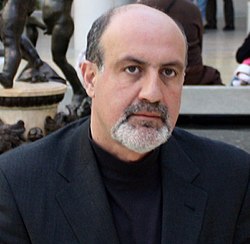Nassim Nicholas Taleb Quote
There is a simple test to define path dependence of beliefs (economists have a manifestation of it called the endowment effect). Say you own a painting you bought for $20,000, and owing to rosy conditions in the art market, it is now worth $40,000. If you owned no painting, would you still acquire it at the current price? If you would not, then you are said to be married to your position. There is no rational reason to keep a painting you would not buy at its current market rate—only an emotional investment. Many people get married to their ideas all the way to the grave. Beliefs are said to be path dependent if the sequence of ideas is such that the first one dominates.
There is a simple test to define path dependence of beliefs (economists have a manifestation of it called the endowment effect). Say you own a painting you bought for $20,000, and owing to rosy conditions in the art market, it is now worth $40,000. If you owned no painting, would you still acquire it at the current price? If you would not, then you are said to be married to your position. There is no rational reason to keep a painting you would not buy at its current market rate—only an emotional investment. Many people get married to their ideas all the way to the grave. Beliefs are said to be path dependent if the sequence of ideas is such that the first one dominates.
Related Quotes
About Nassim Nicholas Taleb
Taleb is the author of the Incerto, a five-volume work on the nature of uncertainty published between 2001 and 2018 (notably, The Black Swan and Antifragile). He has taught at several universities, serving as a Distinguished Professor of Risk Engineering at the New York University Tandon School of Engineering since September 2008. He has also been a practitioner of mathematical finance and is currently an adviser at Universa Investments. The Sunday Times described his 2007 book The Black Swan as one of the 12 most influential books since World War II.
Taleb criticized risk management methods used by the finance industry and warned about financial crises, subsequently profiting from the Black Monday (1987) and the 2008 financial crisis. He advocates what he calls a "black swan robust" society, meaning a society that can withstand difficult-to-predict events. He proposes what he has termed "antifragility" in systems; that is, an ability to benefit and grow from a certain class of random events, errors, and volatility, as well as "convex tinkering" as a method of scientific discovery, by which he means that decentralized experimentation outperforms directed research.
